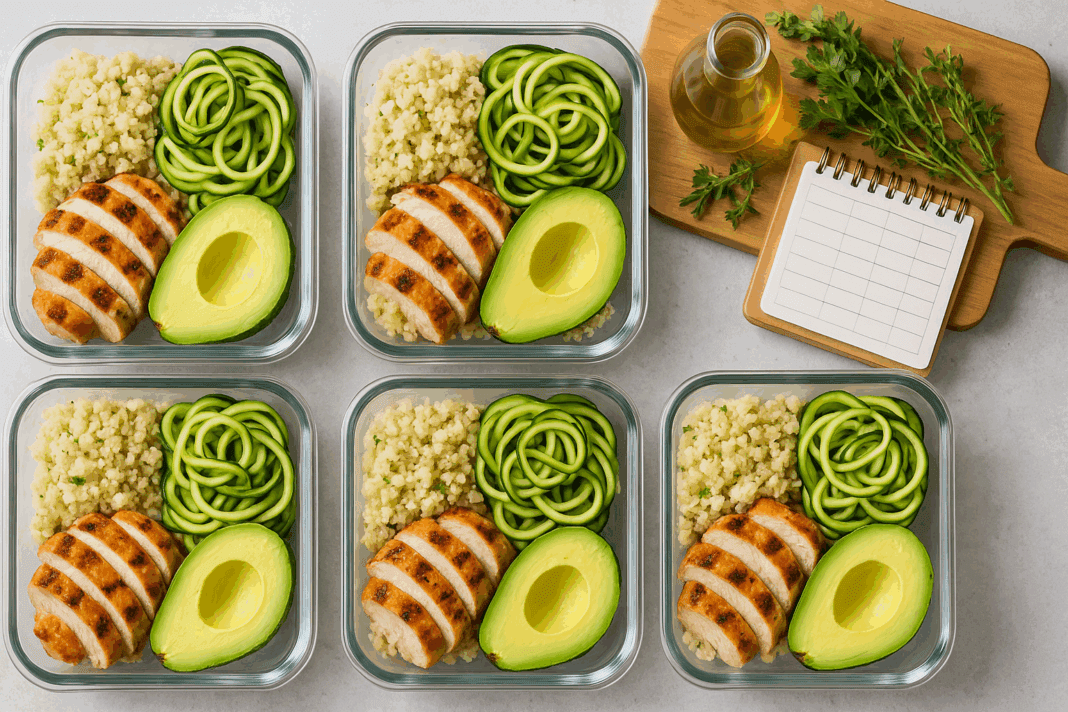Navigating the path toward improved health and energy can feel overwhelming, especially when balancing a demanding lifestyle. Yet for many, adopting a low carb approach to eating offers a powerful solution. What makes this dietary shift particularly effective is not just its potential for weight loss, but the profound impact it can have on stabilizing energy, managing insulin response, and promoting long-term metabolic health. This is where strategic meal preparation becomes a vital tool, particularly when approached with intention and sustainability in mind. In this comprehensive guide, we explore smart meal prep ideas for a low carb diet that support weight loss and promote enduring vitality, while also diving deep into the nuances of the ketogenic diet vs low carb approaches.
You may also like: Smart Meal Prep for Weight Loss: Expert-Approved Lunch Ideas and Recipes to Stay on Track
Understanding the Foundations: Is Keto a Low Carb Diet?
To begin, it’s essential to distinguish between a low carb diet and a ketogenic one. Many people ask, “Is keto a low carb diet?” The answer is yes—all ketogenic diets are low carb, but not all low carb diets are keto. A ketogenic diet is an ultra-low-carb, high-fat, moderate-protein regimen designed to trigger ketosis, a metabolic state where the body relies on fat rather than glucose for energy. On the other hand, a low carb diet can be more flexible, allowing for a broader range of carbohydrate intake that still promotes weight loss and blood sugar control without inducing ketosis.
This distinction matters because it influences how one plans meals. Someone seeking low carb food prep ideas may not need the strict macronutrient tracking required for ketosis. Instead, they can focus on reducing refined carbohydrates and sugars while emphasizing vegetables, lean proteins, and healthy fats. Understanding these differences allows individuals to select an approach that aligns with their health goals and lifestyle preferences.
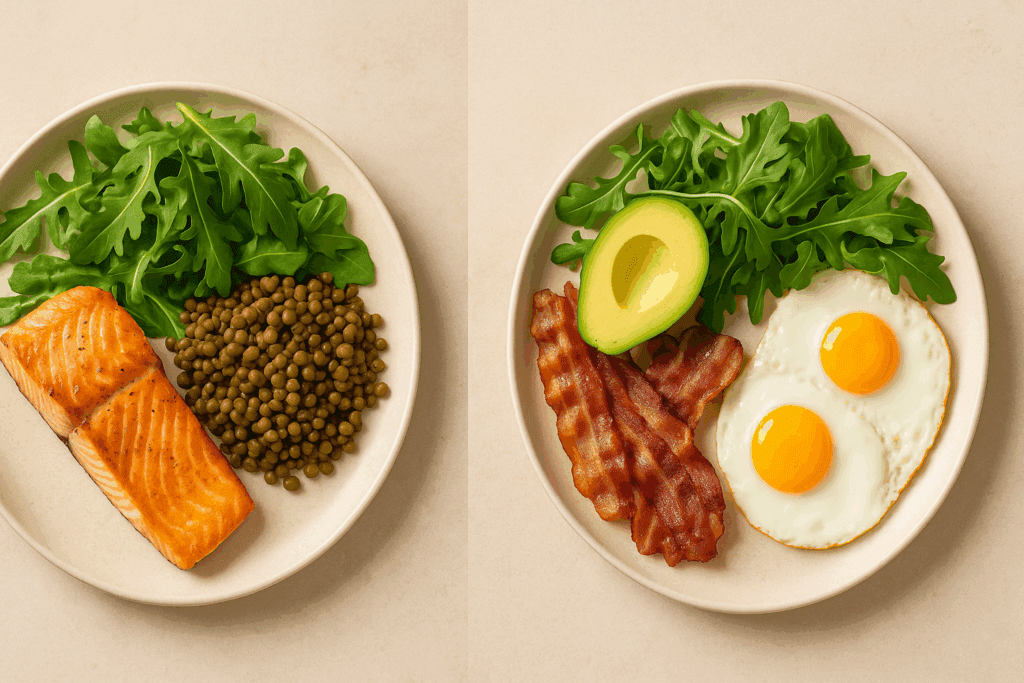
Meal Prep as a Lifestyle Strategy: The Benefits Beyond Convenience
Meal prep transcends mere convenience; it is a lifestyle strategy rooted in mindfulness, discipline, and health empowerment. Prepping meals in advance ensures consistent access to nutritious options, especially when navigating demanding work weeks, family obligations, or travel. It also curbs impulse decisions that often lead to less nutritious, high-carb convenience foods.
One of the most significant benefits of low carb meal prep ideas for weight loss is the reduction in decision fatigue. When your meals are pre-planned and pre-cooked, you’re far less likely to reach for carb-laden snacks or rely on fast food. Moreover, thoughtful meal preparation ensures portion control, reduces food waste, and saves money. It helps individuals stay accountable to their dietary intentions and provides a greater sense of autonomy over their health journey.
Sustainable Weight Loss and Energy Through Low Carb Meal Design
For weight loss to be truly sustainable, it must be supported by consistency and satisfaction. Too often, restrictive dieting creates a cycle of deprivation and bingeing. Low carb meal prep helps circumvent this pattern by ensuring access to satisfying, nutrient-dense meals that sustain energy and promote fullness. Meals rich in protein and healthy fats, coupled with low-glycemic vegetables, provide a steady release of energy throughout the day.
Whether you’re following a ketogenic diet vs low carb strategy, the core principle is to reduce insulin spikes and stabilize blood sugar. This hormonal stability contributes significantly to appetite regulation and energy balance. When blood sugar is stable, you experience fewer cravings and more sustained cognitive and physical performance. This metabolic environment is ideal not only for weight loss but also for preserving lean muscle and optimizing body composition over time.
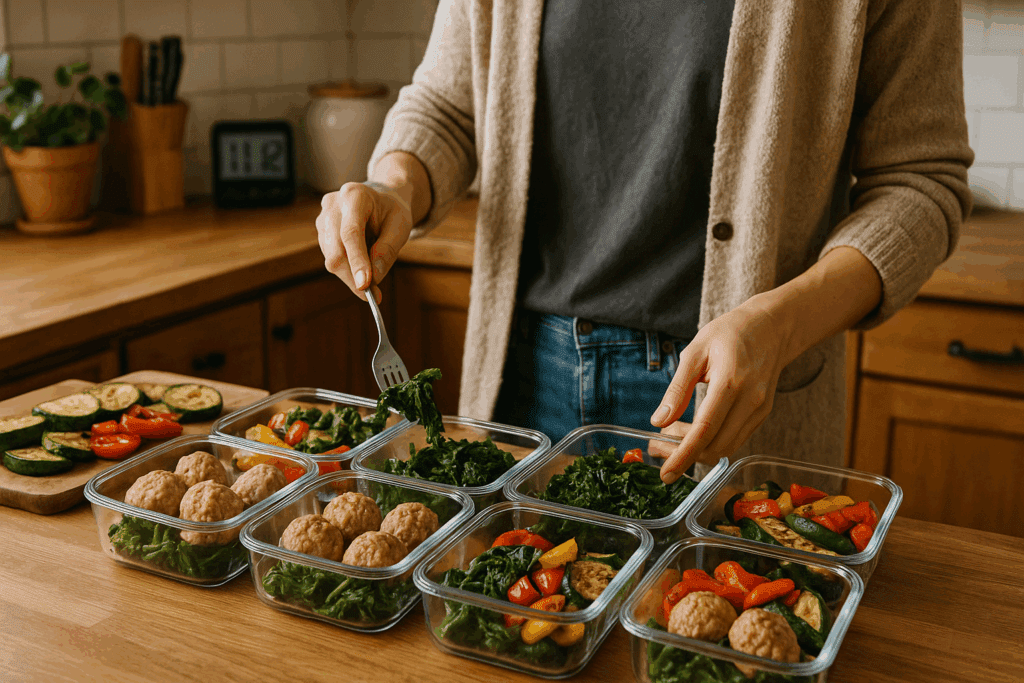
Demystifying Common Misconceptions: Is Keto No Carbs?
A pervasive myth about ketogenic diets is that they require the complete elimination of carbohydrates. This leads to the question, “Is keto no carbs?” The truth is that while keto is extremely low in carbohydrates, it is not entirely carb-free. Most ketogenic plans allow for approximately 20 to 50 grams of net carbs per day, which can include non-starchy vegetables, nuts, seeds, and small portions of low-sugar fruits like berries.
Understanding this nuance is essential for accurate and effective meal planning. Including fibrous vegetables such as spinach, kale, and broccoli not only helps meet micronutrient needs but also supports digestive health and satiety. Moreover, these plant-based sources of carbohydrates add volume, texture, and flavor to meals, enhancing enjoyment without compromising dietary goals.
Exploring Meal Prep Ideas Low Carb Enthusiasts Can Trust
When brainstorming meal prep ideas low carb individuals will find practical and enjoyable, it helps to start with foundational staples. Think in terms of building blocks: a protein source, a fiber-rich vegetable, and a healthy fat. Rotisserie chicken with roasted Brussels sprouts and avocado is one example. Ground turkey stir-fry with cauliflower rice and coconut oil is another.
Batch cooking is a key strategy. Preparing several servings of proteins like grilled salmon, shredded chicken, or boiled eggs in advance allows for easy assembly throughout the week. Likewise, roasting a medley of low carb vegetables or spiralizing zucchini noodles creates versatile components for multiple meals. Sauces and seasonings can provide variety, helping prevent palate fatigue.

The Evolution of Delivery Services: Finding Low Carb Options in NYC
In major cities like New York, the landscape of food delivery is evolving. With increasing demand for health-conscious meals, many companies now offer curated low carb menus. For individuals with busy schedules, incorporating meal delivery NYC services that specialize in low carb options can be an effective way to stay on track without sacrificing quality or variety.
From high-end meal delivery platforms to app-based startups, options abound for those seeking to maintain a low carb lifestyle on the go. Some services even cater to keto-specific plans, offering meals with macronutrient breakdowns and ingredient transparency. This trend represents a promising shift toward greater accessibility and convenience in health-focused eating.
Balancing Macronutrients: Protein, Fat, and Carbohydrate Ratios
Whether you opt for a ketogenic diet vs low carb plan, understanding macronutrient balance is critical. On keto, fat intake often comprises 70% or more of daily calories, with protein at around 20% and carbohydrates below 10%. For a more flexible low carb approach, these ratios may shift to allow for higher protein and moderate fat intake.
Individual factors such as metabolic rate, physical activity, and specific health goals will influence your ideal macronutrient distribution. For example, athletes or those engaged in resistance training may benefit from slightly higher protein intake to support muscle repair. Meanwhile, individuals focused on energy stability or cognitive performance may prioritize healthy fats such as olive oil, avocado, and fatty fish.
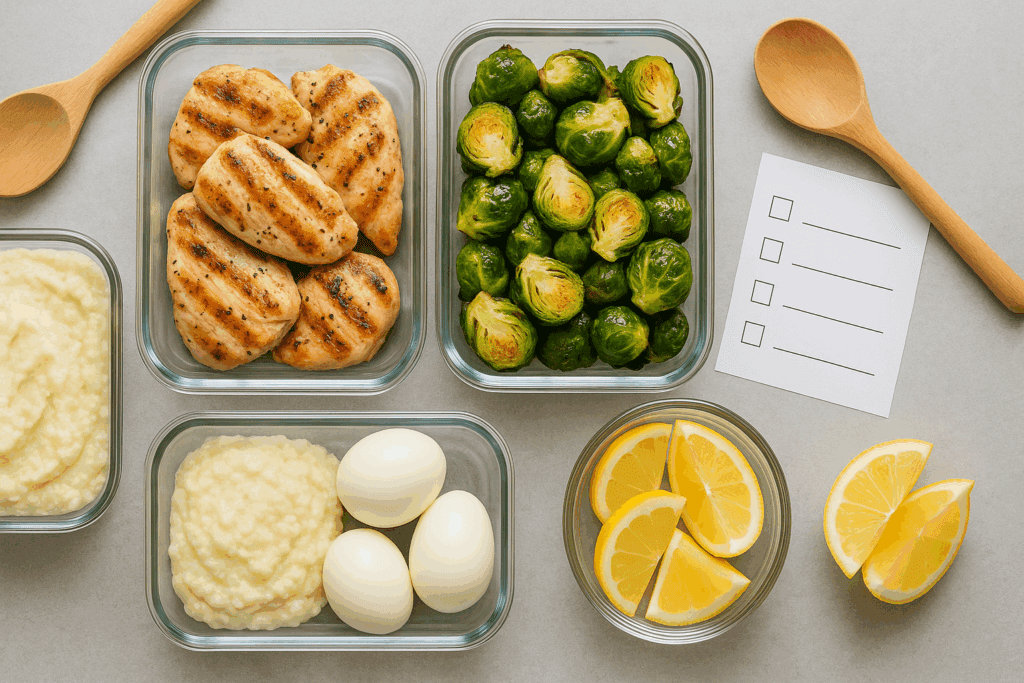
Culinary Creativity: Adding Flavor and Variety Without the Carbs
A common concern among newcomers is that a low carb diet may feel monotonous. However, this doesn’t have to be the case. With a bit of culinary creativity, meals can be flavorful, diverse, and deeply satisfying. Using herbs, spices, and acid-based condiments like vinegar and lemon juice can brighten dishes without adding carbs.
Cauliflower, in particular, is a versatile low carb staple that can be transformed into rice, mash, pizza crust, or even flatbread. Shirataki noodles offer another low carb pasta alternative, ideal for stir-fries and soups. Eggplant can be grilled, layered in casseroles, or stuffed for a hearty main dish. These substitutions allow for variety and indulgence while supporting your low carb meal prep goals.
Meal Prep for Specific Goals: Weight Loss, Energy, and Maintenance
Not all low carb meal prep ideas for weight loss will look the same. Those seeking to shed pounds may focus on creating calorie deficits with lean proteins and fibrous vegetables, while others aiming for energy stability may incorporate higher fat content. Maintenance-focused individuals may allow for occasional higher-carb meals from whole-food sources like lentils or quinoa, depending on their tolerance and metabolic flexibility.
Regardless of your goal, mindful meal prep allows for intentional eating and supports long-term habit formation. Tracking how different meals affect your mood, energy, and satiety can provide valuable insight into what combinations work best for your unique physiology. This data-driven, personalized approach reflects a deep understanding of nutrition science and reinforces EEAT principles in daily practice.
Staying Motivated: Tips for Long-Term Adherence
Adherence is the single greatest determinant of dietary success. While it’s easy to feel motivated at the beginning of a new eating plan, sustaining that motivation over time requires strategy. One of the best ways to remain engaged is to periodically refresh your recipe rotation. This keeps meals exciting and prevents boredom from derailing your progress.
Another tip is to make meal prep a ritual rather than a chore. Set aside a specific day and time each week for shopping and cooking. Involve your family or housemates, and turn on music or a podcast to make the process more enjoyable. Investing in quality storage containers, portioning meals in advance, and labeling items by date can also streamline the experience.
Leveraging Digital Tools: Apps, Trackers, and Online Communities
Technology can be a powerful ally in your low carb journey. Mobile apps allow you to track macros, log meals, and even scan barcodes for nutrition information. Some apps offer low carb food prep ideas and grocery lists based on your preferences and dietary restrictions. Digital meal planners can help you visualize your week and reduce last-minute decision-making.
Online communities offer another layer of support. Whether through social media groups or dedicated forums, connecting with others pursuing similar goals provides accountability and inspiration. You can exchange recipes, troubleshoot challenges, and celebrate milestones together. This sense of community enriches the process and reinforces your commitment to a healthier lifestyle.
The Sustainability Question: Is a Keto Diet Sustainable Long-Term?
A crucial consideration for anyone exploring low carb or keto approaches is sustainability. Many ask, “Is a keto diet sustainable over the long term?” The answer varies. For some, keto is a lifestyle they thrive on indefinitely. For others, its restrictions make long-term adherence challenging. What matters most is finding an approach that you can maintain with joy, consistency, and health.
Rather than treating low carb or keto as a temporary fix, view them as tools in your broader wellness toolkit. You may cycle in and out of keto phases based on your goals, or gradually increase carbs over time to find your personal balance. Understanding the ketogenic diet vs low carb differences empowers you to make informed choices tailored to your needs.
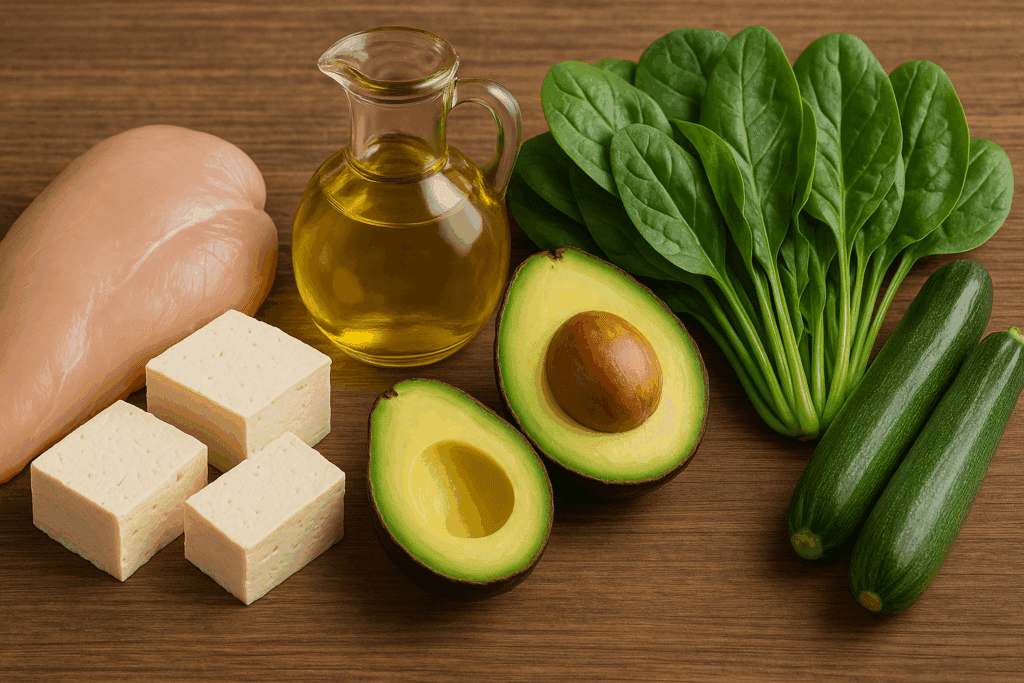
Frequently Asked Questions: Low Carb Meal Prep for Weight Loss and Energy
What are some overlooked but effective low carb food prep ideas for beginners?
One of the most underappreciated strategies for beginners is utilizing frozen pre-cut vegetables andprotein packs. These options save time without compromising nutritional value and make it easier to commit to low carb food prep ideas consistently. Additionally, investing in flavor enhancers like infused olive oils, flavored vinegars, and low-carb sauces can elevate simple dishes without adding extra carbs. For example, using roasted garlic oil with pre-grilled chicken and frozen cauliflower rice offers a gourmet feel with minimal effort. For those new to meal prep, starting with basic, repeatable meals that change only in seasoning can provide a sense of mastery before branching into more complex recipes.
How can I adapt low carb meal prep for a family with mixed dietary needs?
Balancing family preferences with your goals is possible with a modular approach. Start by preparingversatile ingredients—such as grilled chicken, roasted vegetables, and boiled eggs—that can be combined differently for each family member. One person might want their portion served over quinoa, while another prefers cauliflower rice. By using this mix-and-match method, you can stick to your low carb food prep ideas while allowing flexibility for others. This also makes it easier to batch-cook core ingredients and avoid the burnout of cooking separate meals for every dietary preference.
What are the best long-term strategies for maintaining low carb meal prep ideas for weight loss?
Sustainability is key. Begin by rotating your meal prep schedule every 3 to 4 weeks to avoidmonotony, which is a common reason people abandon low carb meal prep ideas for weight loss. Incorporate seasonal produce to keep meals fresh and budget-friendly. It’s also helpful to prepare sauces and dressings in bulk—like creamy tahini or cilantro-lime vinaigrette—to quickly change up the flavor profile of your staples. Establishing a grocery list of go-to items also helps streamline the process, particularly if you’re shopping on a tight timeline. These strategies ensure that meal prep remains efficient, enjoyable, and results-driven.
Are there any unexpected ingredients that work well in low carb meal prep ideas for weight loss?
Yes, several lesser-known ingredients are highly effective for meal prep ideas low carb enthusiastswill appreciate. Cabbage steaks, for instance, can be roasted or grilled and serve as a flavorful base for savory toppings. Lupini beans, although slightly higher in carbs, are rich in protein and fiber and can be portioned in small amounts for variety. Shirataki noodles are another excellent option for those missing pasta; they absorb sauces well and are virtually carb-free. These ingredients provide texture and diversity, helping reduce reliance on typical low carb vegetables like broccoli and zucchini.
How do social factors impact the success of a low carb meal prep lifestyle?
Social dynamics play a critical role in dietary adherence. People often face peer pressure during groupmeals, celebrations, or office events. One strategy is to prep a few shareable low carb dishes that can be brought to social gatherings, such as deviled eggs with avocado or mini cauliflower crust pizzas. This allows you to stay on track while still participating fully. Moreover, involving family or friends in your meal prep process can create a supportive environment and improve accountability. A shared understanding of your goals makes it easier to prioritize meal prep ideas low carb without feeling socially isolated.
How do I choose between cold vs. reheated meals when following low carb food prep ideas?
Both options have merit depending on your routine. Cold meals such as lettuce wraps with tunasalad, antipasto platters, or chia pudding with almond milk are excellent for on-the-go lifestyles. They also help preserve certain nutrients that might degrade when reheated. However, reheated meals like stuffed peppers with ground turkey and cheese or beef stir-fry with bok choy provide a warm, comforting option, especially during colder months. A well-rounded meal prep plan incorporates both to offer variety and meet different mood or situational needs.
Can I follow low carb meal prep ideas if I travel frequently for work?
Absolutely—travel doesn’t have to derail your routine. Focus on portable, nutrient-dense items likehard-boiled eggs, nut butter packets, sliced cucumbers, and low-carb protein bars. Booking accommodations with a kitchenette allows you to prep quick meals even on the road. Alternatively, some airports and hotels are increasingly offering options that align with low carb food prep ideas, such as grilled proteins with steamed veggies. With a bit of planning, travel can seamlessly integrate into a low carb lifestyle, especially if you keep a compact meal prep kit in your bag.
What role does mindset play in sticking with meal prep ideas low carb focused?
Mindset is arguably the most underestimated success factor. Viewing meal prep as self-care ratherthan a chore fosters long-term consistency. When you see preparing meals as a way to fuel your body and honor your health, the task feels more rewarding. It also helps to set realistic expectations and embrace flexibility. If one day doesn’t go as planned, having frozen backups or quick-assembly meals reduces stress and helps you bounce back. This psychological resilience supports sustained adherence to meal prep ideas low carb, even during periods of high pressure or travel.
How do I optimize my kitchen setup to support consistent low carb meal prep?
Efficiency starts with a well-organized space. Clear pantry clutter and designate sections for keycategories: proteins, fats, spices, and carb alternatives. Invest in time-saving tools like an air fryer, Instant Pot, or mandoline slicer, which make chopping and cooking quicker. Labeling containers and using stackable storage systems help maintain order and visibility. Setting up your kitchen this way transforms it into a low-stress environment that encourages creativity and makes following low carb food prep ideas feel more approachable. When your environment supports your goals, success becomes much more attainable.
Are there new innovations or tech tools that enhance low carb meal prep ideas?
Yes, the intersection of technology and nutrition has created tools specifically designed to simplifymeal prep ideas for low carb diet plans. Apps like Carb Manager and Senza offer barcode scanning, meal logging, and custom recipe tracking. Smart kitchen appliances now include app-controlled slow cookers and fridges that notify you when items are low or expiring. Some services even provide subscription-based ingredient kits tailored to your dietary macros. As this tech evolves, it empowers users to refine their low carb meal prep ideas with precision and less effort, making adherence more feasible in fast-paced lives.

Conclusion: Embracing a Low Carb Lifestyle with Clarity and Confidence
Whether you are drawn to the precision of keto or the flexibility of a general low carb approach, one thing remains true: success lies in preparation. Thoughtful meal prep allows you to align your eating habits with your health goals, reduce stress, and enhance energy throughout your day. From understanding macro balance to exploring meal delivery NYC services, every choice you make reinforces your commitment to well-being.
By focusing on low carb meal prep ideas for weight loss, you foster consistency and remove guesswork from your routine. Exploring the nuances of keto diet vs low carb diet strategies helps you select an approach that feels sustainable and satisfying. Ultimately, the question isn’t just, “Is keto a good diet?” but rather, “Which version of low carb living empowers me to feel my best every day?”
With the right knowledge, tools, and mindset, smart meal prep becomes not only manageable but transformational. By integrating scientifically valid principles and personalized strategies, you build a foundation for health that is informed, empowered, and enduring.
Further Reading:
30-Day Low-Carb Meal Plan, Created by a Dietitian
7-Day High-Protein Low-Carb Meal Plan, Created by a Dietitian

